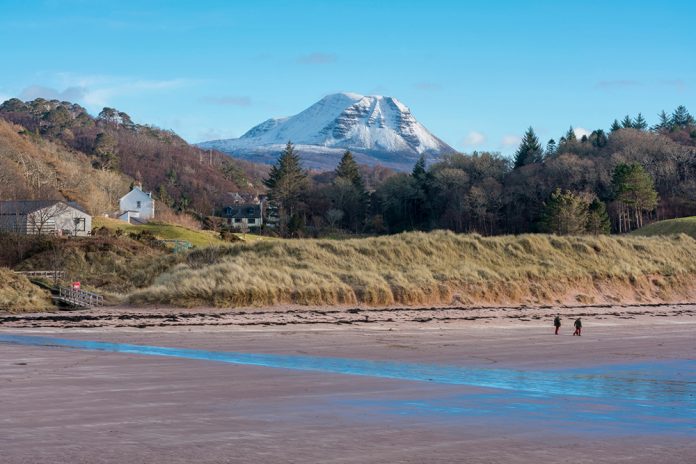Popular visitor destinations across the country will share just over £2.6 million in funding for projects to improve facilities as part of Scotland’s drive for sustainable tourism.
Eleven projects across the country have been recommended for approval – subject to conditions – to receive cash from round four of the Rural Tourism Infrastructure Fund (RTIF).
Sustainable tourism takes account of its impact on the community and natural surroundings, maximising the positives whilst minimising the negative effects.
Managed by VisitScotland on behalf of the Scottish Government, the RTIF was created to improve the quality of the visitor experience in rural parts of Scotland that have faced pressure on their infrastructure due to an increase in visitor numbers.
It aims to reduce the impact of visitor numbers on local communities and facilities and create a more collaborative and sustainable approach to infrastructure provision and long-term maintenance of local facilities for the benefit of communities.
Round four was open for applications from local authorities and national park authorities, in partnership with their communities, and is aimed at funding infrastructure improvements such as parking with EV charging points and e-bike facilities, campervan facilities – including disposal points – viewpoints and toilet provision.
Round four applications recommended for approval include:
£375,000 for the Grandtully Visitor Management Project which aims to tackle visitor management pressures on the River Tay. The funding will go towards the creation of an additional 40 car park spaces with 17 toilets, improved interpretation signage, camping facilities and installation of six EV charging points plus e-bike charging points and facilities.
£147,354 for the creation of toilets and motorhome facilities at the main beach car park in Gairloch to cater for the increasing numbers of visitors to the area using the North Coast 500 route.
£228,200 for parking and visitor facilities at Glen Affric. The project will increase the parking capacity at Dog Falls car park for larger vehicles, replace the aging toilet, restore and upgrade the bridge and improve cycle infrastructure including four e-bike charge points.
In what was an extremely competitive round of applications, 25 were received from 11 local authorities, with assessors approving a total of 11 projects for the Highlands, Stirling, Argyll & Bute, Perth & Kinross, Moray Speyside, and West Lothian council areas.
Over the four rounds of RTIF, £14.5 million of grant funding has been awarded to 56 projects across 13 local authorities and both national park authorities – from the Scottish Borders to Shetland. These have included projects at Glenfinnan and Doune Castle to alleviate parking pressures, due to increased interest from Harry Potter and Outlander fans.
Business and Tourism Minister Ivan McKee said: “Scotland’s breathtaking natural scenery and rich historical sites attract many visitors and help the local economy. However, this can also put pressure on communities, services, transport and facilities – particularly in rural areas.
“The Rural Tourism Infrastructure Fund is dedicated to helping deal with increasing demand, driving sustainable tourism, and increasing visitor experience in rural Scotland.
“This funding will help our tourism industry as it recovers by supporting the ongoing creation of much needed infrastructure such as new car parks, charging points for vehicles and e-bike facilities at some of our most iconic rural and natural attractions. This investment is crucial so that visitors from home and abroad can continue to enjoy our fantastic landscape, culture and hospitality for years to come in a sustainable way.”
Malcolm Roughead, VisitScotland Chief Executive, said: “The Rural Tourism Infrastructure Fund is an important part of creating a sustainable tourism model in Scotland. Not only does it improve the visitor experience but enhances access and facilities for the wider community.
“We all need to play our part in being responsible visitors and these improvement projects will ensure our visitor destinations remain sustainable for years to come.
“VisitScotland is committed to working with the industry and communities to create a long-lasting sustainable tourism destination which will protect the environment and benefit visitors and residents alike.”
Councillor Angus Forbes, Convener of Perth & Kinross Council’s Environment and Infrastructure Committee, said: “We are delighted that the funding has been awarded which will allow significant investment in the facilities at the Scottish Canoe Association’s site at Grandtully.
“The camping and motorhome market is a growing one and we have seen the pressures that this has brought on rural communities, particularly in the last couple of years. The Council is committed to working with partners to identify visitor management solutions and to providing the infrastructure that our area needs and which our visitors expect.”
Paul Hibberd, Forestry and Land Scotland Visitor Services Manager, said: “Glen Affric is a stunning place to visit, with some of the finest scenery in Scotland. Providing good quality visitor facilities in remote locations can be very expensive – we are delighted to receive this support, to help us improve the visitor experience at this well loved and beautiful destination.”
Fran Cree, Gairloch Area Development Ltd Secretary, said: “The Gairloch Community is delighted to receive RTIF funding to be able to progress on the much needed all year round facilities at Gairloch beach where the high demand for modern, environmentally friendly facilities has been long needed.
“Not only will the new facilities service visitors and local residents using Gairloch beach and the touring camper vans in the area but will also help the community retain the highly valued European Clean Beach designation currently held.”






